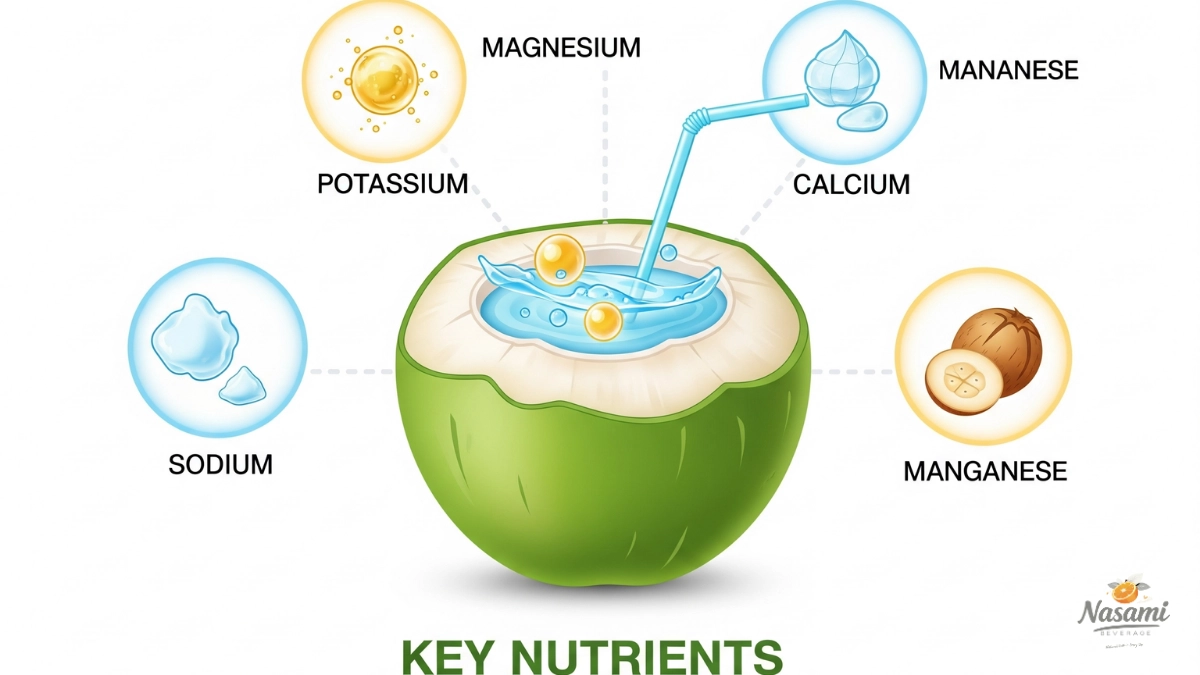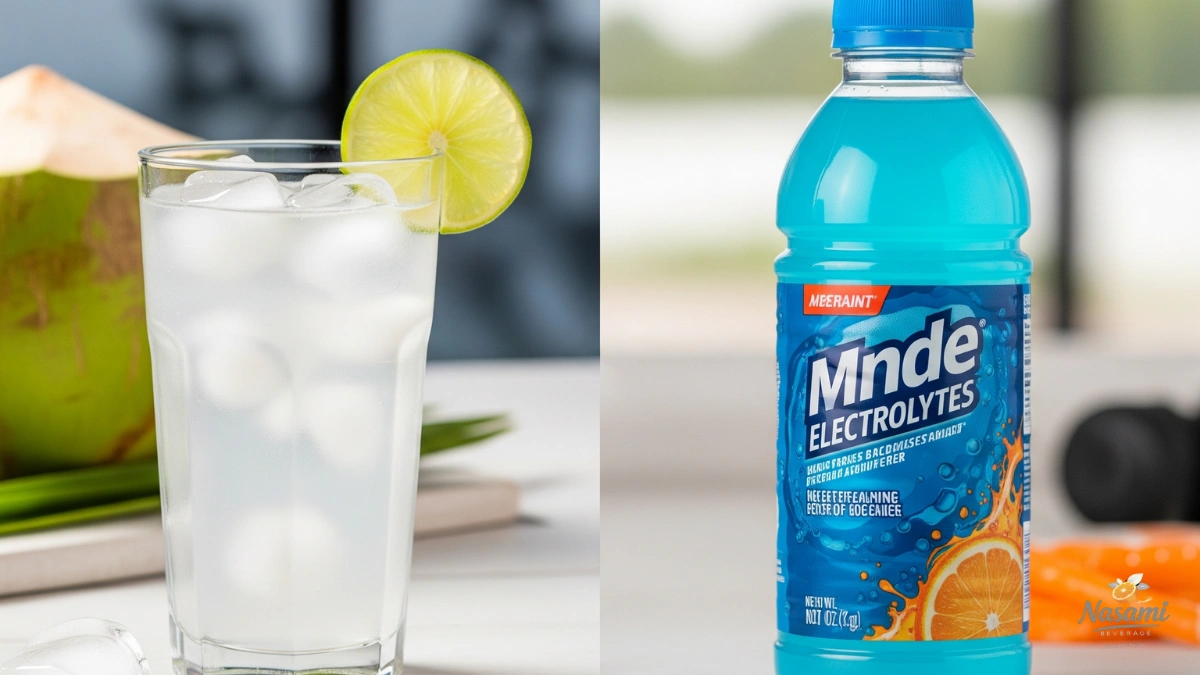Coconut water is a transparent, natural beverage extracted from young, unripe coconuts, and should not be confused with coconut milk, which is a creamy liquid derived from mature coconuts. As a low-calorie and low-sugar drink, coconut water is naturally abundant in electrolytes such as potassium, making it an exceptional option for hydration.
This characteristic positions it as a healthy alternative to traditional sugary sports drinks. The consumption of coconut water offers a range of health benefits, including support for physical performance during exercise, maintenance of cardiovascular health, and effective hydration.

Furthermore, emerging scientific research indicates that coconut water may also play a role in promoting kidney health and improving skin conditions such as acne.
What it is
The liquid inside young coconuts
The liquid found inside young coconuts is a clear, natural beverage that is present within the tender, green, and unripe fruits of the coconut palm. This liquid develops naturally as the coconut matures and serves as nourishment for the growing seed inside.
Often referred to as coconut water, it is collected from coconuts that have not yet fully ripened, typically between six to nine months of age. At this stage, the liquid is at its highest volume and offers a mild, slightly sweet flavor with a refreshing quality that has made it a popular drink in tropical regions around the world.

Not the same as coconut milk
It is important to distinguish coconut water from coconut milk, as the two are very different both in their method of extraction and nutritional content. Coconut milk is produced by grating the white flesh of mature coconuts and mixing it with water.
This process creates a creamy, opaque liquid that is high in fat and calories, often used in cooking and baking for its rich flavor and texture. In contrast, coconut water is naturally low in calories and fat, and is valued primarily for its hydrating properties and high electrolyte content.
Key benefits
Electrolyte-rich
Coconut water is well known for its impressive electrolyte content, making it a popular choice for hydration, especially in hot climates or after physical activity. Among its many nutrients, potassium stands out as the most abundant electrolyte present.
Potassium plays a crucial role in the body by helping to regulate fluid balance, support proper muscle function, and maintain healthy blood pressure levels.
In addition to potassium, coconut water also contains other important electrolytes such as sodium, magnesium, and calcium, all of which work together to help replenish the body’s lost fluids and minerals during sweating or dehydration.
Because of this unique composition, regularly drinking coconut water can provide benefits not only for hydration but also for overall heart health, as balanced electrolytes are essential for the proper functioning of the cardiovascular system.

Hydrating
Coconut water serves as an excellent natural source of hydration due to its high water content and balanced blend of essential nutrients.
Because it contains a significant amount of fluids along with electrolytes like potassium, sodium, and magnesium, it is particularly effective at replenishing the body’s water stores.
This makes coconut water a suitable choice for anyone looking to maintain hydration throughout the day, especially in situations where there is increased fluid loss, such as after exercise, during hot weather, or following an illness that causes dehydration.
The light, refreshing taste and absence of artificial additives also make coconut water an appealing alternative to many commercial sports drinks, providing a gentle and natural means of supporting overall hydration for people of all ages.
Low in calories and sugar
One of the notable advantages of coconut water is that it is naturally low in both calories and sugar, making it a healthier beverage option compared to many popular sugary drinks such as sodas, sweetened juices, or energy drinks.
This quality makes coconut water especially appealing for individuals who are mindful of their calorie intake or seeking to reduce their consumption of added sugars.
Unlike many commercially available beverages that contain high levels of refined sugars, artificial sweeteners, or preservatives, coconut water provides a subtle, naturally sweet flavor without the need for any additional ingredients.
Choosing coconut water as a daily refreshment can help support a healthier lifestyle by contributing to better weight management and reducing the risk of health issues associated with excessive sugar consumption, such as obesity, type 2 diabetes, and dental problems.
Supports bodily functions
Coconut water not only provides hydration but also delivers a variety of essential nutrients that play a vital role in maintaining overall health.
It contains important minerals such as magnesium, phosphorus, and calcium, all of which are necessary for numerous bodily functions. Magnesium supports muscle and nerve function, phosphorus contributes to healthy bones and teeth, and calcium is crucial for bone strength and proper heart function.
In addition to these minerals, coconut water offers small amounts of B vitamins and vitamin C. B vitamins are important for energy production, metabolism, and maintaining a healthy nervous system, while vitamin C acts as an antioxidant and supports immune health.
By supplying these nutrients in a natural and easily absorbed form, coconut water can help support the body’s daily functions and contribute to long-term well-being.
Considerations
For most people
Coconut water is considered a safe and healthy beverage choice for the majority of individuals. Its natural composition, which is low in calories and sugar but rich in essential nutrients and electrolytes, makes it suitable for regular consumption as part of a balanced diet.
Most people can enjoy coconut water without any adverse effects, whether they are using it to stay hydrated, support their exercise routines, or simply as a refreshing alternative to other beverages. However, as with any food or drink, moderation is key.
It is generally well tolerated, but those with specific medical conditions or dietary restrictions-such as individuals with kidney problems or those who need to limit their potassium intake-should consult a healthcare professional before making coconut water a regular part of their diet.
Overall, for the average person, coconut water offers a wholesome and natural way to support hydration and general health.

Kidney disease
For individuals with kidney disease or impaired kidney function, it is especially important to be cautious about the amount of coconut water consumed. Coconut water contains a relatively high level of potassium, an essential mineral that is normally regulated by healthy kidneys.
In people with kidney problems, the body may not be able to remove excess potassium efficiently, which can lead to dangerous buildups in the blood. Elevated potassium levels, also known as hyperkalemia, can cause serious health complications, including irregular heart rhythms or even cardiac arrest in severe cases.
Therefore, those with kidney disease or anyone who has been advised by a healthcare professional to limit their potassium intake should consult with their doctor before incorporating coconut water into their diet. Careful management is necessary to avoid potential risks and ensure overall health and safety.
Check the label
To maximize the health benefits of coconut water, it is important to carefully read the product label before making a purchase. According to advice from the Cleveland Clinic Health Essentials article, consumers should select coconut water that is unsweetened and free from added sodium.
Many commercially available coconut water products can contain added sugars, artificial flavors, or extra salt to enhance taste, which may reduce the overall nutritional value and introduce unnecessary ingredients. By choosing plain, natural coconut water with no added sugars or sodium, you can ensure you are getting the purest form of the beverage and reaping the full advantages of its naturally occurring nutrients.
Paying close attention to the ingredient list and nutrition facts will help you make healthier choices and avoid products that could undermine the positive effects coconut water can provide for hydration and overall well-being.



